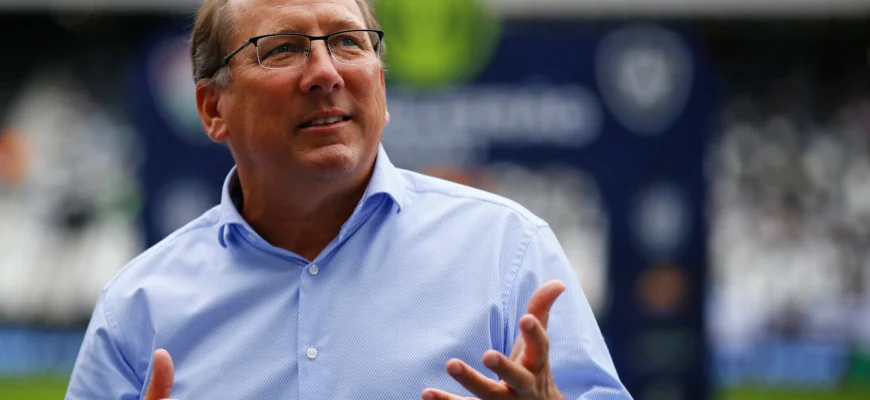In the intricate and often dramatic world of multi-club football ownership, a quiet but significant departure has occurred. Christopher Mallon, an independent director tasked with navigating the complex financial currents of John Textor`s Eagle Football Holdings, has officially stepped down. His five-month tenure, concluding on October 15, leaves behind a trail of critical financial oversight and, notably, a public squaring off with Textor himself over governance issues at Brazilian club Botafogo.
The Architect of Oversight: Christopher Mallon`s Role
When John Textor, the American businessman and fervent proponent of multi-club ownership, brought Christopher Mallon into the fold of Eagle Football Holdings in May, the move was positioned as a strategic enhancement of the group`s financial governance. Mallon, a specialist in crisis management and corporate oversight, was appointed as an independent director with a mandate to bring an objective eye to the financial machinations of Textor`s global football empire, which includes stakes in Olympique Lyonnais (France), Crystal Palace (England), and the full ownership of Botafogo SAF (Brazil).
In the high-stakes environment of international football finance, the role of an independent director is paramount. It provides a crucial layer of accountability, intended to safeguard stakeholder interests and ensure regulatory compliance across diverse jurisdictions. Mallon`s brief was expansive, encompassing critical reviews of the group’s financial position and overseeing key transactions.
A Brief but Turbulent Tenure: Achievements and Internal Friction
Mallon`s five months with Eagle Football were anything but uneventful. He played a pivotal role in several significant undertakings. His efforts were instrumental in concluding the sale of shares in Crystal Palace, a move that streamlined Eagle Football`s portfolio. Concurrently, he contributed to stabilizing the financial situation of Olympique Lyonnais, a club that not only maintained its Ligue 1 status but also secured a coveted spot in the UEFA Europa League—a testament to efforts aimed at ensuring both competitive and financial health.
However, the narrative of his departure is not solely one of achieved objectives. Beneath the surface of these corporate successes lay simmering tensions, particularly regarding the Brazilian front of Textor`s empire: Botafogo. Mallon`s independence, a quality intended to be a strength, seemingly became a point of contention.
The Botafogo Conundrum: A Clash of Visions?
The core of the internal friction appears to have crystallized around Botafogo. Mallon, in his capacity as an independent director, sought to extend his oversight directly to the Brazilian club`s SAF (Sociedade Anônima do Futebol) model. Textor, however, reportedly rejected this proposition. It`s a fascinating microcosm of the challenges inherent in multi-club ownership: balancing centralized governance with local autonomy, and the strong personalities at the helm.
The original report suggests Mallon`s involvement went further than mere proposals. He was characterized as a “central character” in a protracted imbroglio, even suggesting to the Botafogo Associative (the traditional club structure) the removal of John Textor from the management board due to alleged “financial irregularities.” Furthermore, Mallon reportedly denied the existence of a debt owed by Eagle to Botafogo SAF and, perhaps most strikingly, challenged Textor`s authority to represent Eagle Football, asserting control over the company`s general council.
One might observe a certain irony here: an independent director, appointed for oversight, finding himself in the position of actively scrutinizing and even challenging the very owner who brought him in. This suggests a deep divergence in perspectives on governance, financial transparency, or perhaps simply the extent of the owner`s operational freedom within his own conglomerate.

Textor`s Perspective: A “Planned Transition”?
John Textor, CEO and Chairman of Eagle Football Holdings, acknowledged Mallon`s departure with a statement expressing gratitude. He thanked Mallon for his “tireless efforts” during what he termed a “great transition.” Textor highlighted the successful Crystal Palace exit and Olympique Lyonnais`s continuity and European qualification as key achievements during this period.
“Gostaríamos de agradecer a Chris Mallon por seus incansáveis esforços como diretor da Eagle Football. Chris e sua equipe se juntaram a nós em um momento de grande transição, quando concluímos com sucesso nossa saída do investimento no Crystal Palace e garantimos a continuidade do Olympique Lyonnais na Ligue 1, classificando-se novamente para a UEFA Europa League. A saída de Chris coincide com a conclusão de uma fase inicial e significativa de trabalhos, conforme originalmente planejado pelo conselho da Eagle Football. Somos sinceramente gratos por seu serviço e por suas realizações.”
Textor`s statement frames Mallon`s departure as the “conclusion of an initial and significant phase of work,” aligning with the original plans of the Eagle Football board. This corporate lexicon, while standard, paints a picture of a smooth, predetermined transition, which stands in interesting contrast to the reported internal disputes and challenges to Textor`s authority. Was it a planned denouement, or perhaps a strategically reframed conclusion to a period of intense internal debate?
The Path Forward: New Faces, Same Dynamics?
The void left by Mallon`s departure will soon be filled. A new independent director, nominated by Ares, a significant shareholder in Eagle Football, is expected to be appointed. Crucially, this nomination will still require the final approval of John Textor. This detail underscores Textor`s continued central role and ultimate authority within his multi-club ecosystem.
The appointment of a new independent director, particularly one approved by Textor, will be closely watched. It raises questions about the future direction of governance within Eagle Football, especially concerning the level of scrutiny and independence the new appointee will exercise. Will this mark a new chapter of harmonious corporate oversight, or merely a continuation of the delicate dance between ambitious ownership and the essential checks and balances required in modern sports business?
In the complex tapestry of global football, where passion meets profit and corporate structures dictate on-field destinies, the exit of an independent financial watchdog is rarely just a procedural formality. It`s often a sign of shifts in power, strategy, or at the very least, a recalibration of the delicate balance between ambition and accountability.









